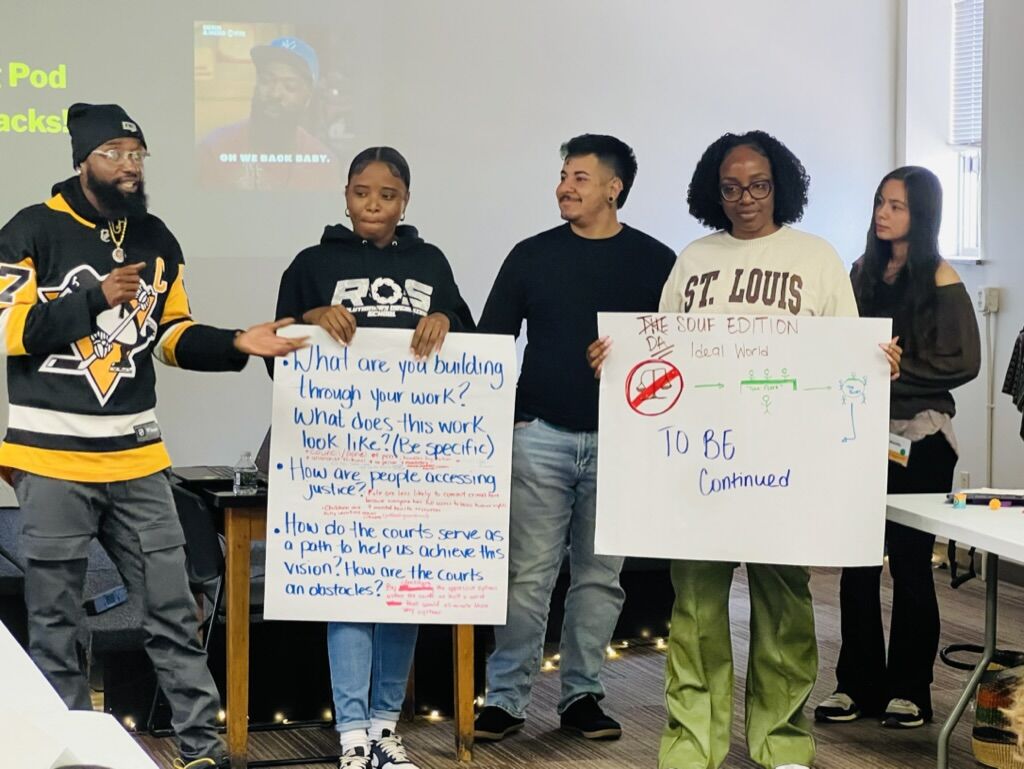From abortion rights to protest, custody and gender identity, state courts hold the power to shape our freedoms—or strip them away.
This essay is part of an ongoing Gender & Democracy series, presented in partnership with Groundswell Fund and Groundswell Action Fund, highlighting the work of Groundswell partners advancing inclusive democracy. You’ll find stories, reflections and accomplishments—told in their own words—by grassroots leaders, women of color, Indigenous women, and trans and gender-expansive people supported by Groundswell. By amplifying these voices—their solutions, communities, challenges and victories—our shared goal is to show how intersectional organizing strengthens democracy.
While national headlines fixate on the U.S. Supreme Court, state courts shape nearly every part of our lives. From traffic violations and business disputes to child custody and criminal charges, an estimated 95 percent of all legal cases in the United States are handled in state courts.
State courts decide whether you can access abortion care, whether your protest leads to jail time, whether you keep custody of your child and whether your gender identity is protected or punished. Despite their vast power, state courts remain one of the most overlooked battlegrounds—and opportunities—in the fight for justice. As organizers, we’ve seen the cost of that neglect. Now we’re calling on progressive movements to treat state courts not as a footnote, but as a headline.
This fight won’t be easy. Conservatives dedicated decades to capturing the courts and building an infrastructure of power that operates behind the scenes. Since the 1980s, the Federalist Society has cultivated a pipeline of judges to dominate the federal judiciary, including all three of Trump’s Supreme Court picks. By the mid-2000s, this strategy pivoted to state courts. Backed by a coordinated dark-money agenda, billionaires like Leonard Leo and the Koch network funneled billions into reshaping state courts to serve their political interests.
They may hide behind super PACs and “judicial impartiality,” but there is a distinct playbook: Flood the courts with extremists, then shield them with claims of neutrality. Hijack the language of democracy and weaponize it to attack “activist judges.” Use dog whistles like “law and order” to justify criminalizing dissent. Let’s be clear. When Elon Musk tweets that a woman running for judge is an “activist,” he’s trying to discredit her before she can rule against corporate power. When Trump loyalists gut judicial ethics rules, they aren’t just bending the law. They are rewriting the rules of power.
Their agenda is to dismantle constitutional protections, disempower communities of color, and consolidate white moneyed interests. And it’s working. Today, nearly 60 percent of state supreme court justices were appointed by Republican governors, according to Alliance for Justice. Most of these courts now lean conservative, marking a dramatic shift from decades ago. These are the same courts that determine whether trans people are protected under the law, whether corporations can pollute without consequence, and whether communities can hold police accountable. If your fight for justice ends in front of a state court judge, the odds are already stacked against you.
For too long, many in our movements have treated courts as venerable and neutral institutions. In reality, they’re deeply political arenas already shaped by political strategy.

We don’t have to guess what’s at stake because we’re already living it, which is why diversity on the bench matters. Across the country, most state supreme courts do not reflect the full diversity of the people they serve—seating no Black, Latinx, AAPI, Native or openly LGBTQ+ judges.
And it’s not just race, gender or sexual orientation—professional and ideological diversity matter too. Right now, most judges come from the same narrow set of professional backgrounds: corporate law firms, prosecutors’ offices, and the defense bar. According to the Brennan Center for Justice, nearly 40 percent of state supreme court justices are former prosecutors, while only 10 percent have served as public defenders, and just 2 percent come from civil legal services or community advocacy backgrounds. That imbalance matters. Judges who’ve spent their careers defending corporations or prosecuting people are more likely to uphold the status quo. And for working people, poor folks and Black and brown communities, that skew in perspective can shape everything from sentencing to housing to labor rights.
The truth is, for too long, many in our movements have treated courts as venerable and neutral institutions. In reality, they’re deeply political arenas already shaped by political strategy. Too many organizing campaigns end with the legislature. Too many voter guides exclude judicial elections. Too many everyday citizens don’t know how judges are selected or who funds them. Courts still seem mysterious, opaque, even off-limits.
That has to change.

Across the country, trans, queer, BIPOC and grassroots organizers are beginning to connect the dots and putting state courts on their power maps. Some are learning how judicial decisions directly shape the issues they’re already organizing around; others are building court watch programs or tracking dark money in judicial elections. This work may not make national headlines, but it is strategic, grounded and transformational.
It is also being supported by movement infrastructure that’s rising to meet the moment. One example is re:power’s State Courts on the Power Map (SCPM) Learning Lab, a 15-week cohort that equips organizers to center the courts as sites of power for our people to seize. By combining skill-building and political education, the program is helping to grow a new wave of movement leaders holding courts accountable and shaping the future of justice in their communities.
Like SCPM 2025 Fellow Nat Williams with Stewardship Utah—when five anti-democracy bills were introduced, Williams raised the alarm, but didn’t yet have the tools to fight back. After joining a national judicial education cohort, Williams built a coalition strategy, shared resources with partners, and helped defeat every single bill. Next up: court literacy efforts all across Utah.
Or look at Milwaukee. In 2022, Black Leaders Organizing Communities (BLOC) launched a court watch program led by formerly incarcerated people. BLOC turned court watching into a civic power play, mobilizing voters around judicial elections. Earlier this year, its efforts helped defeat a state supreme court candidate backed by Elon Musk and other megadonors, securing a progressive majority on Wisconsin’s highest court.
The courts were never meant to serve only billionaires and political machines. They should be accountable to the people fighting for justice, healing and collective dignity. State courts are now our clearest line of defense against rising authoritarianism and fascism.
Great Job Mercedes Fulbright & the Team @ Ms. Magazine Source link for sharing this story.




